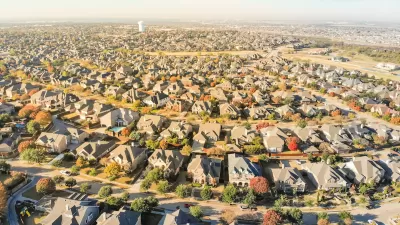There seems to be a lot of rhetoric pitting suburbs and cities against each other in some sort of ideological war. But, as this piece from Grist asks, is that war even real?
"[A]s the rate of suburban poverty increases in the United States and those suburbs become more racially diverse, and as the nation's most prosperous cities become more expensive to live in and more dominated by typically suburban fixtures like chain stores, it may be time to ask whether the dichotomy needs to be revisited.
This is especially true because the environmental stakes involved are so high. The built environment -- how much land we take up, how much fuel we use to get around, how our homes are constructed and powered -- is emerging as a crucial factor in the battle to reduce carbon emissions. Maybe the crucial factor."
Bridging the gap between the pro-sprawl and anti-sprawl commentators seems impossible, but writer Sarah Goodyear suggests that the war can be toned down by searching for common ground between the two sides at the local level.
FULL STORY: Is there a war between cities and suburbs? Does there have to be one?

Maui's Vacation Rental Debate Turns Ugly
Verbal attacks, misinformation campaigns and fistfights plague a high-stakes debate to convert thousands of vacation rentals into long-term housing.

Planetizen Federal Action Tracker
A weekly monitor of how Trump’s orders and actions are impacting planners and planning in America.

In Urban Planning, AI Prompting Could be the New Design Thinking
Creativity has long been key to great urban design. What if we see AI as our new creative partner?

Cal Fire Chatbot Fails to Answer Basic Questions
An AI chatbot designed to provide information about wildfires can’t answer questions about evacuation orders, among other problems.

What Happens if Trump Kills Section 8?
The Trump admin aims to slash federal rental aid by nearly half and shift distribution to states. Experts warn this could spike homelessness and destabilize communities nationwide.

Sean Duffy Targets Rainbow Crosswalks in Road Safety Efforts
Despite evidence that colorful crosswalks actually improve intersection safety — and the lack of almost any crosswalks at all on the nation’s most dangerous arterial roads — U.S. Transportation Secretary Duffy is calling on states to remove them.
Urban Design for Planners 1: Software Tools
This six-course series explores essential urban design concepts using open source software and equips planners with the tools they need to participate fully in the urban design process.
Planning for Universal Design
Learn the tools for implementing Universal Design in planning regulations.
Appalachian Highlands Housing Partners
Gallatin County Department of Planning & Community Development
Heyer Gruel & Associates PA
Mpact (founded as Rail~Volution)
City of Camden Redevelopment Agency
City of Astoria
City of Portland
City of Laramie




























